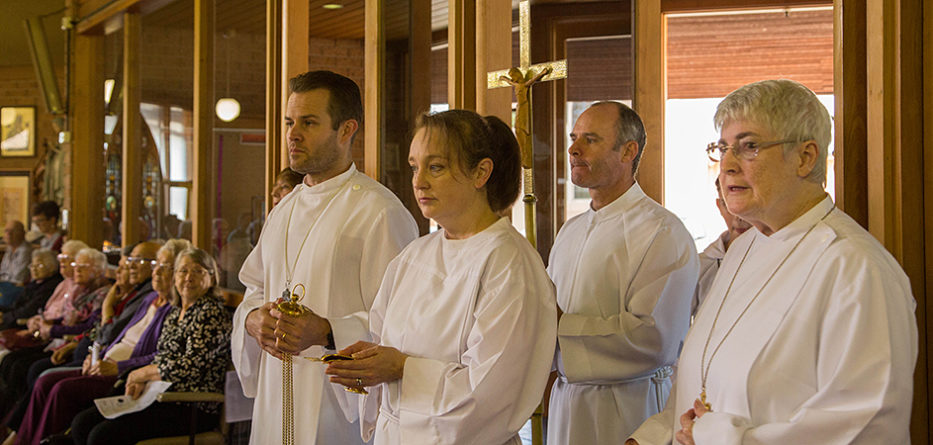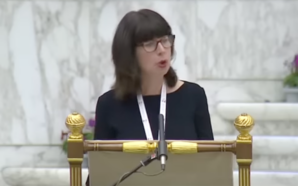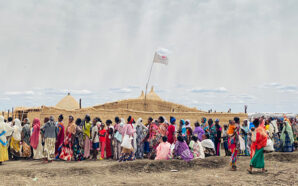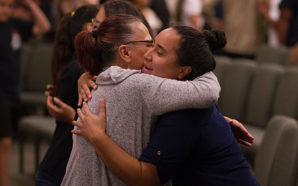Homily for the 17th Sunday in Ordinary Time
Readings: 2 Kings 4:42-44; Psalm 144(145):10-11, 15-18; Ephesians 4:1-6; John 6:1-15
25 July 2021
During these Sundays of Ordinary Time, we have been listening to the Gospel of Mark. For the next five weeks, we take a detour to Chapter 6 of John’s Gospel, “the longest complete sequence in the Fourth Gospel…held together by the motif of Jesus as ‘the Bread of Life’ and the response this evokes from the crowds and the disciples”.[1] There are more than 5,000 to be fed and there is nothing to work with, except the five barley loaves and two fish which the small boy has and happily hands over. Note, the boy does not keep a loaf or half a fish for himself. He gives all that he has. And Jesus works with that. There will be 12 basket loads of scraps left over. There’s plenty for everyone. This story of the bounty of the bread of life has added poignancy in a time of lockdown when the Eucharist is not available to any but a few. This story occasions deeper reflection at a time when the Australian Church is coming to terms with the reality that there are no longer enough Australian-born celibate male priests to go around, increasingly restricting the availability of the bread of life.
LISTEN: https://soundcloud.com/frank-brennan-6/homily-25721
A couple of weeks ago, I was a visitor celebrating a parish Mass. I was introduced to the congregation by the choir leader who had sung at my diaconate ordination 36 years ago. After Mass, she expressed her displeasure that Pope Francis had announced changes to the Code of Canon Law, lumping together the issues of child sexual abuse and women’s ordination. I had not read the changes nor the rationale for same. Hearing her characterisation of the matter, I said, “I can understand your frustration.” She promptly retorted, “It’s not frustration; it’s anger. You have to understand how hard it is for us women to remain.” Canon law has never been a favourite subject of mine. I thought I had better get up to speed.
In 1994, Pope John Paul II solemnly declared “that the Church has no authority whatsoever to confer priestly ordination on women and that this judgment is to be definitively held by all the Church’s faithful.”[2] In 1998, Pope John Paul II then amended the Code of Canon Law to provide that “anyone who rejects propositions which are to be held definitively sets himself against the teaching of the Catholic Church”[3]. Anyone who obstinately rejected such a teaching and refused to retract when warned by their bishop was to be punished with a just penalty. Pope Francis has now authorised a further change to the Code of Canon Law so that the obstinate non-retractor is to be punished with a censure and deprivation of office.[4] The canonical screws are being tightened.
Pope Francis has authorised a comprehensive re-write of Book VI of the Code of Canon Law which defines certain offences and sets down sanctions. Quite rightly he has brought in a string of new offences against human life, dignity and liberty, dealing with child sexual abuse, grooming, pornography, and failing to report abuse. He has also introduced a new suite of offences against the sacraments. Until now the Code has dealt with those who are not ordained but who attempt to celebrate mass and those who purport to hear confessions though they are unable to give absolution. The Code also had a more general provision providing for the punishment of an ineligible person pretending to administer a sacrament. Pope Francis has seen fit to move into the Code a provision (Canon 1379(3)):
“Both a person who attempts to confer a sacred order on a woman, and the woman who attempts to receive the sacred order, incur a latae sententiae excommunication reserved to the Apostolic See; a cleric, moreover, may be punished by dismissal from the clerical state.”[5]
Understandably this has left many people upset, including the woman who sang at my ordination 36 years ago. Why the need for a further specific penal provision to be added at this time to the Code of Canon Law, and at the same time as the much needed overdue legal reforms dealing with child sexual abuse? Why not leave things as they were? This new provision in the Code might not only deal with someone purporting to ordain a woman as priest. It could also apply to anyone purporting to confer diaconate on a woman, and the punishment would also apply to the woman seeking the conferral of the sacred order.
For many years, there has been discussion about two distinct matters: the theological possibility of women priests and the historical evidence for women deacons in various branches of the Catholic Church. Back in 1988, Cardinal Ratzinger, as he then was, spoke at an event in New York where he agreed “that the God of philosophy is neither male nor female, and the God of theology is both”[6]. He told the audience that the matter of women’s ministry as deacons or priests was under study by the Congregation for the Doctrine of the Faith. In 2002, after 28 years of consideration of the matter, the International Theological Commission could not come to a definitive answer on the historical reality of women deacons concluding that “it pertains to the ministry of discernment which the Lord established in his Church to pronounce authoritatively on this question.”[7] Whatever that means!
In 2016, the International Union of Superiors General asked Pope Francis to consider the possibility of women deacons in the contemporary Church. He set up a commission. On 7 May 2019, Pope Francis was asked about the work of the commission during a press conference on a flight back to Rome. He said: “The commission was created and has worked for almost two years. They were all different, all ‘toads from different wells’. They all thought differently, but they have worked together and have agreed to a certain extent. But, each of them has their own vision that does not agree with that of the others. And there they have stopped as a commission and each one is studying how to move forward.” He concluded his answer by saying, “we have reached a point and now each of the members is studying according to their thesis. This is good. Varietas delectat. (Variety delights!)”[8]
Some months later, the participants in the Special Synod of Bishops for the Pan-Amazon Region voted 137 to 30 in favour of the Pope investigating further the possibility of women deacons. In his final address to the Synod, Pope Francis indicated that he welcomed “the request to reconvene the Commission and perhaps expand it with new members in order to continue to study the permanent diaconate that existed in the early Church”[9].
One of those who served on the 2016 commission is the highly respected American theologian Phyllis Zagano. Prior to her appointment, she published an academic article on ‘Women Deacons in the Maronite Church’ stating, “Without question, women were ordained as deacons in many Eastern churches, as copious research demonstrates.”[10] Since completing her term on the papal commission, she has published a book entitled Women: Icons of Christ. She concedes that “the Church teaches women cannot be ordained as priests”. But she then states correctly: “it does not teach definitively that women cannot be ordained deacons.”[11] She reminds us that “Phoebe is the only person in Scripture with the descriptor ‘deacon’ and that Paul did not feminise her title to ‘deaconess’.” She concludes: “That women deacons existed cannot be denied, nor can their participation in sacramental ministry.” What troubles her most is that “Beneath every objection to restoring women to the ordained diaconate is the suggestion that women cannot image Christ.”[12] For her, this is not only a scandal: “it is the disfigurement on the entire Body of Christ” and it “is probably formally heretical”[13]. I quote her because she spent years researching this topic before being appointed to the papal commission. She expressed such views before her appointment, and she has consistently expressed them since.
We who are called to share the bread of life believe that Jesus had to be human so that we might be saved. Being human, he had to be either male or female. He could not be both. That did not mean that only half humanity could be saved. Nor did it mean that only half humanity could be ‘icons of Christ’. Zagano demonstrates in her researches that women were ordained deacons in situations when there was a need for women to minister particularly to women and girls. They were “included in the order of deacon, not only in the early church but at least until the twelfth century in the west (and the East up to modern times)”[14]. Back in 2012, Zagano said, “at some point, however, bishops are going to have to answer the question the International Theological Commission attempted to answer.”[15]
Having reflected on the writings of Zagano, I now more readily understand why the woman who spoke to me after Mass a couple of weeks ago was not just frustrated. She was angry and rightly so. The question about women deacons deserves an answer now. Not even Pope John Paul II claimed to have closed the door on that one. The matter has been crying out for the discernment called for by the International Theological Commission in 2002. Having given up on his first commission of ‘toads from different wells’ and having only recently set up his second commission on the matter, surely Pope Francis could have told the canon lawyers to stay their hand when it came to instituting a specific new offence in canon law dealing with the purported ordination of a woman deacon. The canon lawyers had more than enough on their plate with new offences dealing with child sexual abuse. Zagano takes heart that the Vatican official explaining why the new canonical provision was not confined specifically to priestly ordination said, “If we come to a different theological conclusion, we will modify the norm.”[16]
During the week, we celebrated the feast of St Mary Magdalene, who in the Byzantine Liturgy is called ‘the apostle to the apostles’. I recall the cartoon of the bearded apostles greeting the women with the words, “So ladies, thanks for being the first to witness and report the resurrection and we’ll take it from here.” It’s the women like the one who spoke to me after Mass who still front up each Sunday offering us five barley loaves and two fish. For how much longer can we turn them away? The people are hungry for the Bread of Life, and it’s not just the women. It’s time for a discerned decision which reflects the delightful variety of the faithful.
Fr Frank Brennan SJ is the Rector of Newman College, Melbourne and the former CEO of Catholic Social Services Australia (CSSA).
[1] Brendan Byrne, Life Abounding, St Pauls, 2014, p. 108
[2] Pope John Paul II, Ordinatio Sacerdotalis, 1994, #4, at https://www.vatican.va/content/john-paul-ii/en/apost_letters/1994/documents/hf_jp-ii_apl_19940522_ordinatio-sacerdotalis.html
[3] See Canons 750(2) and 1371.
[4] Compare the new Canon 1365 with the existing Canon 1371.
[5] This provision already exists in Article 5 of the 2010 Substantive Norms formulated by the Congregation for the Doctrine of the Faith as one of the more grave delicts in the celebration of the sacraments. See https://www.vatican.va/resources/resources_norme_en.html
[6] Quoted by Phyllis Zagano, ‘The Question of Governance and Ministry for Women’, Theological Studies 68 (2007) 348 at p. 364
[7] International Theological Commission, From the Diakonia of Christ to the Diakonia of the Apostles, 2002, p. 49 at https://www.vatican.va/roman_curia/congregations/cfaith/cti_documents/rc_con_cfaith_pro_05072004_diaconate_en.html
[8] Pope Francis, Press Conference, 7 May 2019, at https://www.vatican.va/content/francesco/es/speeches/2019/may/documents/papa-francesco_20190507_macedoniadelnord-voloritorno.html
[9] Pope Francis, Closing of the Works of the Special Assembly of the Synod Of Bishops For The Pan-Amazon Region On The Theme: “Amazonia: New Paths For The Church And For Integral Ecology“, 26 October 2019 at https://www.vatican.va/content/francesco/en/speeches/2019/october/documents/papa-francesco_20191026_chiusura-sinodo.html
[10] Phyllis Zagano, ‘Women Deacons in the Maronite Church’, Theological Studies (2016) 593 at p.595
[11] Phyllis Zagano, Women: Icons of Christ, Paulist Press, 2020, Introduction, p. 3
[12] Ibid, Conclusions, p. 1
[13] Ibid, Introduction, p. 1
[14] Phyllis Zagano, ‘The Case for Women Deacons’, Commonweal, 10 December 2012
[15] Ibid.
[16] Bishop Juan Ignacio Arrieta, Secretary of the Pontifical Council for Legislative Texts, quoted by Phyllis Zagano, ‘New canon on women’s ordination nothing new, can be changed’, National Catholic Reporter, 7 June 2021 at https://www.ncronline.org/news/opinion/just-catholic/new-canon-womens-ordination-nothing-new-can-be-changed








